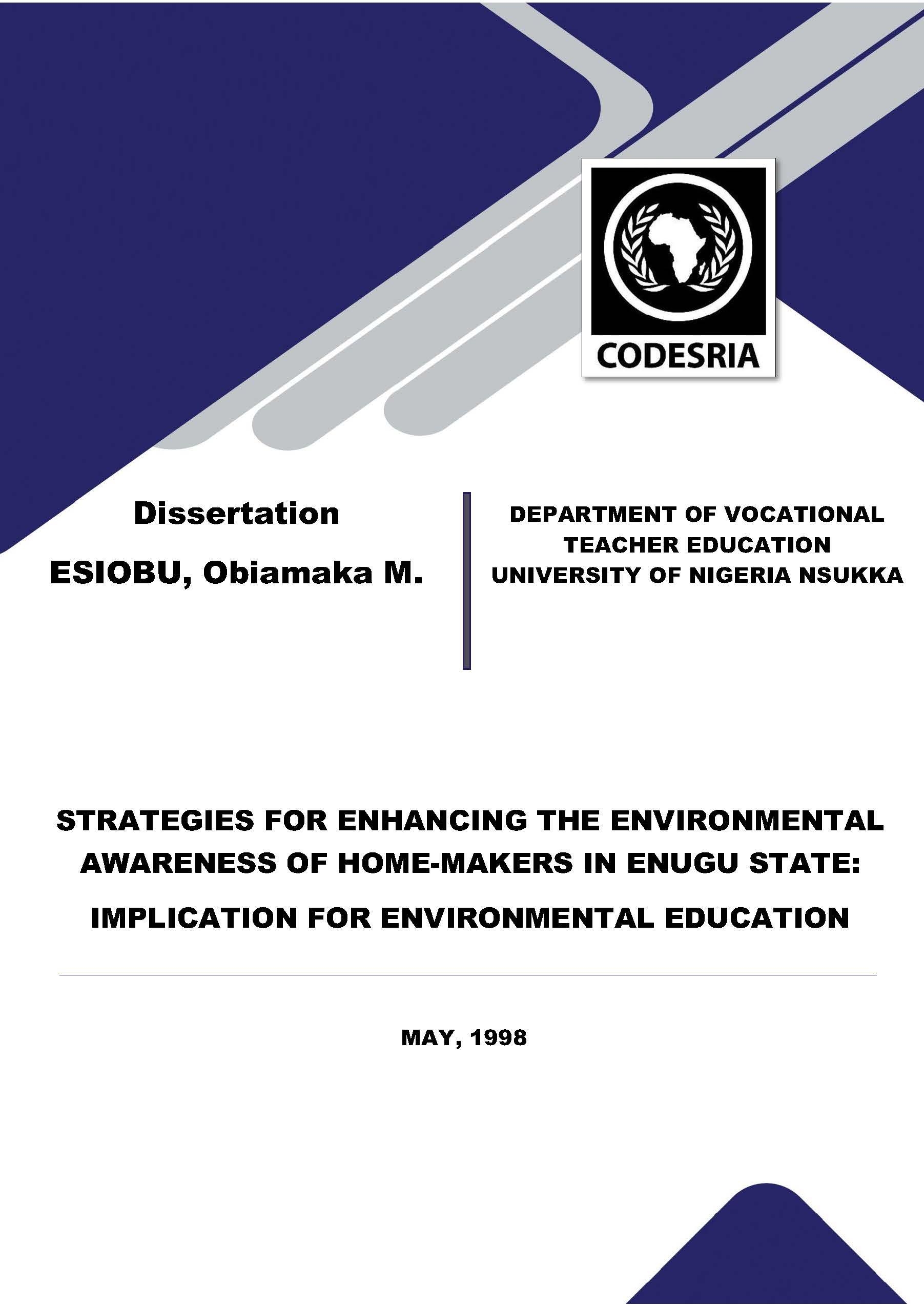Strategies for Enhancing The Environmental Awareness of Home-Makers in Enugu State: Implication for Environmental Education
Keywords:
Environmental education, pollution, water pollution, population growth, women, Nigeria, Enugu StateSynopsis
This study dealt with strategies for enhancing the environmental awareness of home-makers in Enugu State. lt sought answers to the following research questions:
(1) To what extent are home-makers in Enugu State aware of their environment?
(2) What are the environmental education needs of home-makers in Enugu State?
(3) What delivery systems could be employed to extend environmental education to the home-makers in Enugu State.
The population for the study was made upof home-makers in Enugu State. A sample of a hundred. and sixty (160) home-makers was randomly selected from Nsukka and Enugu urban. The instrument for data collection was a questionnaire. Data collection was carried out by the researcher and trained research assistants. Data were analysed using descriptive statistics (frequencies, mean, standard deviation) and chi-square analysis. The major findings inciude:
1. home-makers are aware of:
(i) 60% of the componerts of environment;
(ii) 54.5% of the causes of environmental degradation
(iii) 40% of consequences of environmental degradation.
2. the environmental awareness of the home-makers in Enugu State is significantly independent of their educational status as well as their family size and the type of house they occupy.
3. Ninèteen (19) important environmental education concepts needed by home-makers were identified.
4. Nineteen (19) delivery systems through which environmental education can be extended to home-makers were revealed.
Based on the findings of the study, seven (7) recommendations for enhancing the environmental awareness of home-makers were made .
Downloads
References
Abiola,T.F .. (1991). Status of Environmental Sanitation in Gbongan Township of Ayedape. Unpublished Master's Thesis, University of Nigeria, Nsukka.
Advanced Technology Assessment System (ATAS) (1992). Environmentally Sound Technology for Sustainable development. United Nations, New York.
Aina, T.A. and Salau, A.T. (eds) (1992). The Challenge of Sustainable Development in Nigeria. NEST, Nigeria. P. 93 -118.
Akina, K. and Loto, T. (1993). Towards a Sustainable Urban Environment. World Bank Discussion Papèrs, Washington, USA.
Amsyari, fuad (1980). Operational Approach lo the Environmental Problems in the Developing Countries.
Anderson, S.H. and·Purdon, P.W. (1980). Environmental Science. Charries E. Merril Pub., CO., Columbus, Ohio.
Anyakoha, E.U. (1990). "Women in Food Production: Implications for Home Economies Practice in Developing Countries", in People and Practice: International Issues in Home Economies. Vaino, E.;· Badir, D. and Kierea, D. (eds.), Cadana, Vol. 2, No.2.
Arenne, V: (1996). "Preventive Health Gare". Kith and Kin: TV Programme, Nigeria.
Arnold Pacey (1978). Sanilalion in Developing Countries. John Wiley and Sons Ltd, Britain.
Basta, N. (1992). Environmental Jobs for Scientist and Engineering. John Wiley and Sons, Inc., New York.
Bernstein, J.O. (1994). -Land Use Considerations in Urban Environmental management. world Sank, Washington DC.
Blumenthal, O.S. and Ruttenber, A.J. (eds) (1995). Introduction to Environmental Health. Springer Pub. Co., Inc. USA.
Breecher, M.M. and Linde, S. (1992). Health Homes in a Toxic World: Preventing, identifying, and eliminating hidden health hazards in your home. John Wiley and Sons, Inc., New York.
Charles-Davies, B. (1992). "Environmental Problem: The Nigerian Perspectives". Midweek Concord, p. 84, June.
Ghlebowska, K. (1-990). Literâcy for Rural Women in the Third World. Paris, UNESCO.
Compton; N.H. (1972). Journal of Home Economies. Home Economists: Information Brokers. Spring, 1972.
Connect (1977). "Regional meetings in the context of the International Environmental Education programme". UNESCO- UNEP. EE Newsletter, Vol. Il, NO. 1, March, p. 2-3.
Connect (1988). "Environmental Education".UNESCO - UNEP. EE Newsletter. Vol. XIII, No. 3, September, p. 203.
Connect (1990). "Basic Concepts of Environmental Education",. UNESCO-UNEP. EE. Newsletter, Vol. XV, No. 2, June.
Connect (1991). "From awareness to action via non-formal environmental education". UNESCO-UNEP. EE Newsletter, Vol. XVII, No. 1, March, p. 1 - 2.
UNESCO (1986) Environment Education: Module for Pre-service training to teachers and Supervisors for primary schools. UNESCO-UNEP International Environmental Education programme. Environmentàl_ Education Series, 5, Paris.
UNESCO-UNEP .(1989). Educatfonal Module on Environment programmes in Cities. Envirqnmental Education Series 4, Division of Science, Technical and Vocational Education.






